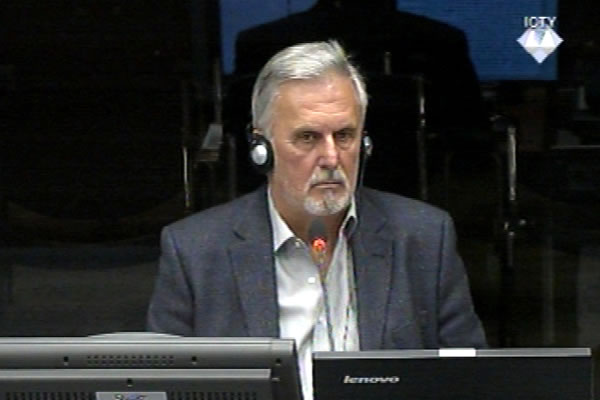Home
UN SOLDIERS WERE ARRESTED "IN MUTUAL INTEREST"
In late May 1995, the commander of the Ilidza Brigade, acting on Ratko Mladic's orders, arrested UN soldiers deployed around Sarajevo. As he testified in Mladic's defense, he claimed that he talked to the French and Ukraine Battalion soldiers as they were placed under arrest. The UN soldiers told him they were ‘aware of the situation’ and then laid down their arms and surrendered to ‘mutual benefit’
 Vladimir Radojcic, defence witness at Rako Mladic trial
Vladimir Radojcic, defence witness at Rako Mladic trial The evidence of Vladimir Radojcic, former commander of the Ilidza Brigade, is relevant for at least two joint criminal enterprises Ratko Mladic is charged with. The first joint criminal enterprise pertains to the artillery and sniper terror campaign against the citizens of Sarajevo and the other to taking UN members hostage. Yesterday, the examination-in-chief focused on modified air bombs, which were, as the prosecution alleges, a major element in the terror campaign against the Sarajevo citizens. Today, the witness described from his perspective the arrests of UNPROFOR soldiers in late May 1995.
As the witness recounted, he ‘received an order from the superior command’ to disarm and arrest the UN soldiers in the area of responsibility of his brigade. Because of theirpurported collaboration with NATO which had launched air strikes against Serb positions, the Bosnian Serb Army decided to treat the UN troops as the enemy soldiers, not peace-keepers. Colonel Radojcic immediately talked to the Ukraine and French officers in charge. The witness ‘explained the situation’ to them and informed them that from then on they were prisoners of war. The UN members ‘agreed’. The disarming and arrest of the UN troops was a ‘compromise’, the witness explained,in ‘mutual interest’. Foreign soldiers were treated ‘as gentlemen’.In recognition of this, the witness recounted, a French officer gave him a monograph of his unit with a dedication thanking him for all he had done for the French soldiers.
The witness didn’t bring the monograph with him in The Hague. However, in the cross-examination the witness promised he would provide it at a later date. When the prosecutor asked the witness if he claimed that UNPROFOR members ‘agreed to become prisoners of war’, the witness admitted that they ‘were not in a position to agree or disagree’. UN soldiers ‘didn’t have a choice’: they could only surrender and lay down their arms. Radojcic also said that he had received the order to arrest the UN troops from his ‘superior command’. This prompted the prosecutor to note that in his previous statement to Radovan Karadzic’s defense Radojcic had said that Ratko Mladic had issued the order. The latest version of the witness’s statement does not contain the two paragraphs where he talked about this issue. The witness replied that it was a ‘typing error’, not the result of his intention to protect Mladic. The witness confirmed that the accused had in fact issued the order to arrest the UNPROFOR members.
In his statement to the defense Radojcic said that during the war the Sarajevo-Romanija Corps was surrounded ‘on the inside and from the outside’ by the BH Army 1st Corps. After the prosecutor insisted on this, asking a number of question, the witness finally admitted that the external ring was in fact ‘half-encirclement’. The road through Rajlovac and Lukavica to Pale was open. The witness then admitted that the territory held by the Sarajevo-Romanija Corps was linked with the area held by the Drina Corps. In 1993, the SRK re-established the corridor with the Herzegovina Corps. Judge Moloto noted that the military map in fact showed that the Bosnian Serb army encircled the BH Army in Sarajevo and not the other way round. The witness eventually agreed with the conclusion.
As the hearing drew to a close, the prosecution turned to the issue of modified air bombs inthe cross-examination, to be continued tomorrow. Radojcic will complete his testimony next week.
Linked Reports
- Case : Mladic
- 2014-06-25 CONTRADICTORY EVIDENCE ON SARAJEVO ‘RANDOM’ BOMBS
- 2014-06-24 'RANDOM' BOMBS LAUNCHED ON SARAJEVO
- 2014-06-23 WITNESS DENIES MARKALE 2 RESPONSIBILITY, INVOKING TYPING ERRORS
- 2014-06-27 MILITARY TARGET MISSED OR CIVILIAN TARGET HIT?
- 2014-07-03 WHO TERRORIZED WHOM IN SARAJEVO
- 2014-07-04 WITNESS: ‘MUSLIMS STAGED MARKALE 1’
